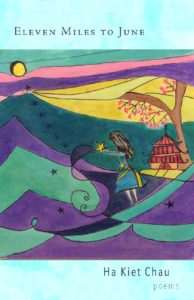 Review by Ana C.H. Silva
Review by Ana C.H. Silva
Reading Ha Kiet Chau’s full-length poetry collection, Eleven Miles to June, published by Green Writers Press, I often felt the same joy of the search I experience while antiquing. That feeling of being in a space of overlapping generations, locations, crossed time-periods; the velvety, almost sticky feel of golden, spotted ephemeral pages filled with scrolling, somewhat indecipherable script laid down with care. As one of Chau’s speakers says in the eponymous poem, “the poet inside me aches for all things gone” (14). And yet, here is one of the insights of her book: all things are gone, but also present: “I outrun wolves but can’t escape the lost child.” They are alive in our dreams and interweave themselves into our days.
Turning the pages, the reader doesn’t know what century, country, speaker or lifetime we will wake up into; her collection recreates those full, chaotic moments of waking up in another country or bedroom where we are more open to that unmoored, tremulous space of being. Fittingly, one poem, a ghazal, repeats the word “tremble.” We may wake up in NYC, Guangzhou, Shanghai, San Francisco, Hanoi, in the city or the countryside, in 770 BCE during the blossoming Zhou civilization and also with Adam and Eve; and we may be anyone: a tree, a girl, a hummingbird, two lovers who intertwine and eventually, untangle.
Romance is alive here, infused with energy of mother nature which is expressed in pathetic fallacy and also in an unapologetic appetite for both catastrophe and passion that energizes her lines and characters. Sometimes, her undercurrent will bring up unexpected blood: beach waters suddenly crimson. We bob in the waves of Chau’s collection, not at ease, but often at peace, tasting the sharp salts of our lives, feeling the shock of colder waters at interplay with the warmer surface layers, aware that at some point, at any point, the ocean will take us in again.
Chau’s collection does not shy away from speaking truths that come out of her culturally rich heritage, considering the mucky, nightmarish war fields of Hanoi during the 11 nights of American bombing, a father’s thunderous anger, a friend’s suicide, racist classmates, the impossible challenge of assimilation within someone who contains many cultures, who pulls from the heroism of Amelia Earhart and Buddha, finding “[n]o way home.” As she writes in “Fitting Inside a Sphere,”
Assimilation is a slow process like
squeezing into a pair of skinny jeans,
tight at first, but after a bit of sweat
and struggle, it fits and now
I have to walk in them. (17)
Eleven Miles to June is divided into three sections: “Close-Up”, “Wide-Shot” and “Fade-Out”, reminding us, perhaps, of that close connection between the poet and the filmmaker. Chau is a skillful filmic poet who is not afraid of the montage, of interleaving, of a richly extended metaphor that stretches and invents the way only a skillful poem or film can do. In the end, I’d argue, Chau does find a way through to a kind of home as she finds calmer coves of tender reflection, especially in her flâneuse-style poems studded with Chau’s close attention and skillful moments of magical flight. For instance, from “Lonely Wolf and the City”:
In the evening gray, the city is vacant.
I’m two blocks from home
and the ants on the concrete are the only ones
who can hear a rumble at twilight,
the thud of a peach pit dropping
from my hand onto wheatgrass and soil. (18)
And perhaps, especially tender are those moments found within her sadder poems, as in “Dakota” when her doll stands in for the speaker’s mother in grief for the husband who abandoned her:
Dakota’s pigtails stick like beeswax.
I unbraid her hair, shampoo her curls in the sink.
She smells like oranges and soap.
I can’t scrub the sadness off her face.
She sits motionless in daylight as I sew
the rips and holes in her Cinderella dress,
Smooth out the wrinkles. (21)
Underneath the grape jelly sandwiches and pitchers of lemonade in “In Her Yellow Dress” (25) are war scars, memory that surface when neighborhood firecrackers “detonate.”
Ma squeezes her eyes shut.
She doesn’t shudder, her body is stoic
as a fig tree rooted to rock-hard soil.
Sunlight shimmers on her yellow dress,
jade pearls, silver hair.
Somehow, Chau helps us understand that life is lived in shifting layers that keep us feeling the roil of the thousands of emotions that rise and fall through us each day; this is just how it is when we have done so much to each other, when we have lived so much in this life, and in our other lifetimes.
Ma licks grape jelly off her knuckles.
Tidbits of breadcrumbs slide from her lap
onto hot asphalt — she is unaware.
Two bluebirds idle near her bare feet.
They peck blindly at the crumbs, fly
Away in tandem.
Eleven Miles to June by Ha Kiet Chau
Green Writers Press 2021, Paper, 120 pp.
Isbn: 978-1-9505841-4-7
Ana C. H. Silva lives in NYC and the Catskills. Her poems live in various print and online journals. She won the inaugural Rachel Wetzsteon Memorial Poetry Prize at the 92nd St. Y Unterberg Poetry Center, and her 2019 chapbook, One Cupped Hand Above the Other, is with Dancing Girl Press. Her chapbook While Mercury Fish is published through Finishing Line Press.
